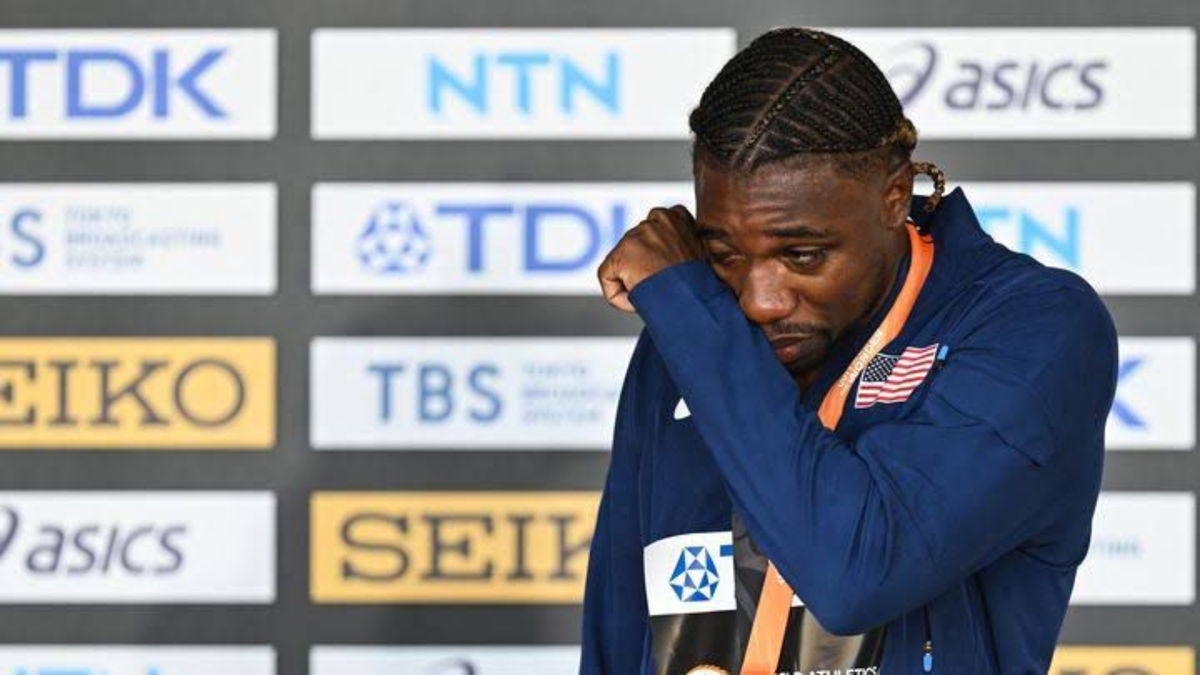

After Noah Lyles won bronze in the 200m at the Tokyo Olympics, he was deeply hurt by his performance and sought a fresh start in 2022. In May, Lyles turned to this 400m hurdles silver medalist of the 1972 Munich Olympics for guidance to refine his starts. The feedback for Noah was blunt. “He came by, looked at it, and said, ‘That’s trash,’” Lyles recalled. “He’s very blunt, and I’m a blunt person so I can take it. Still, it was like, ‘Okayyyy. That hit differently.’” Despite the tough criticism, Lyles embraced the adjustments, which led to “drastic improvement” in the first 30 meters of his races. But was it only athletic knowledge that this trainer brought to Noah? Absolutely not.
Watch What’s Trending Now!
Probably the most important thing that this former 400-yard hurdles world record holder added to Noah’s practice was his scientific knowledge of sprinting. And why not? After all, this accomplished athlete had earned his Ph.D. in biomechanics at Washington State University in 1975. After his athletic career, he shifted his focus to using biomechanical analysis on elite sprinters and hurdlers to evaluate and improve their performances. Here is Dr. Ralph Mann, 3x back-to-back NCAA champion and former University of Kentucky professor, Who, after helping Noah turn his bronze in Tokyo into a gold in Paris, passed away on January 2. He was suffering from pancreatic cancer.
Mann’s relationship with Noah was not just limited to a trainer and trainee, it was special. In his 300-page textbook on the mechanics of sprinting and hurdling, Mann listed a series of athletes as the best in certain categories. There are the most talented, the most professional, the most driven, and the best representatives of the sport, but he puts Lyles as one of his favorites. He was so confident about Noah’s abilities that he once said, “I know Noah’s biggest competition is Noah. Noah’s not going to get beat. The only way Noah’s going to get beat is if he beats himself because we know that he puts together a great start and he puts together his top and speed nobody on the planet’s going to be.” So, after Mann passed away, Noah offered his tribute with a post that had a distinct personal touch to it.
ADVERTISEMENT
On January 4, Noah posted a photo of them both and the caption that he wrote struck a chord: “For those who don’t know who this is, this is Ralph Man! An Olympian and former world Record holder But that’s not why I know him.”
“I know Ralph because he is the crazy scientist that helped me and my coach turn me into the athlete I am today. He brought a new way of thinking to my starting blocks that help me to become a great 60m runner and 100m Olympic Champion. I will forever be grateful for the love and support he showed me and for sharing his craft I will forever remember you . RIP Ralph and THANK YOU 🙏🏾 🕊️” His fiancée Junelle Bromfield also left a touching comment: “RIP Ralph Mann 🕊️💔.” So how did Mann actually bring about the changes for Noah?
Mann’s insights proved essential in addressing one of Lyles’ key weaknesses: his starts. In 2023, during training, Mann bluntly told Lyles, “Your reaction times suck.” Despite Lyles’ exceptional top-end speed, his slow starts were holding him back. From his experience of studying over 500 elite athletes for more than 40 years, Mann developed a software in 1999. It generates a stickman that overlays the video of the sprinter in the blocks, illustrating the ideal form and timing for each step. The model allowed them to compare Lyles’ movements with the most efficient technique, offering real-time feedback.
ADVERTISEMENT
Mann’s coaching focused on getting Lyles to adjust his hips, reduce foot turnover, and minimize contact time during the first few steps. Mann knows his work so intricately that he can confidently claim that he knows what “it takes to be an elite starter.” Here is how he breaks it down.
View this post on Instagram
ADVERTISEMENT
“There’s two parts to a start and they’re completely different. First three steps are just pure power, quickness and the next four steps are starting to lift and transition into the full speed. The really good ones hit their seventh Step at the 10 m Mark. If you’re shorter it’s a little shorter, if you’re far tall like bolt and it’s a little farther. Noah is basically the typical right around the average height [5’10”] of a sprinter so he hits the 10-meter mark dead on. When we started with him he was hitting what we look at for the girls that’s like 9 meter.”
Noah initially found it difficult to adjust. He even joked with Mann, saying, “Let’s see your precious model beat me,” and challenged Mann to set the model at a pace faster than Lyles’ best. But through their sessions, Lyles improved, especially after a breakthrough in February 2024 when he beat Christian Coleman for the first time in the 60m indoors, despite Coleman’s faster start. This showed that the adjustments were beginning to pay off. Fast forward to the Olympic final in Paris.
Lyles still had one of the slowest reaction times in the field in the 100m final— 178 milliseconds, which was tied for the slowest. But his refined technique allowed him to make up for that by 60m, where he moved from a 6th place at the halfway point to 3rd by the 60m mark. He surged ahead in the final 40m, finishing in 9.78 seconds, a personal best and the fastest time since Usain Bolt’s 9.63 in 2012. He closed the final 40m in 3.35 seconds, the fastest in the race, showing how his top-end speed and improved form had come together. Need one more instance of Mann’s knowledge?
ADVERTISEMENT
The biomechanist had predicted the race would be extremely close. Lyles, after winning gold, reflected on how accurate Mann’s words had been, acknowledging, “I can’t believe how right he was.” Interestingly, although much less publicized, Mann’s magic touch has helped one more athlete to turn into a phenom.
Ralph Mann’s techniques helped this athlete hurdle past shortcomings
“What the hell do I have to do to beat her?”: this was the question the athlete had for Mann as she referred to her arch-rival. This 400m hurdles phenom first met Mann in 2018, and Mann was not happy with her technique. That was none other than Sydney McLaughlin Levrone who was rattled by Dalilah Muhammad at that point.
ADVERTISEMENT
Not only in Rio but in the 2019 World Championship, Dalilah and Sydney ran one of the closest world championships finals. Both beat the previous world records. But Dalilah once again took away the victory, being just .07 seconds faster than Sydney. What was the matter that Mann had identified?
“Sydney had problems. She couldn’t hurdle with her opposite leg. With her primary leg, she was mediocre at best. And her training wasn’t to the point where she could handle the last three hurdles,” Mann had explained. So Sydney and her coach Bobby Kersee collaborated with Mann.
Top Stories
Greg Biffle Plane Tragedy: What Might Have Caused the Crash That Killed the NASCAR Champ and His Family

What Is Alycia Baumgardner’s Net Worth in 2025? Career Earnings, MVP Deal With Jake Paul, Biggest Purse & More

Jake Paul vs. Anthony Joshua Fight Purse: How Much Are Alycia Baumgardner and Others Earning?

Leila Beaudoin Relationship Status: Is the Canadian Boxer Married or Single?

Alycia Baumgardner Boyfriend/Husband: All About Her Relationship Status and Dating History

Jahmal Harvey vs. Kevin Cervantes Stats Comparison and Prediction: Record, Age, Height, Reach, Weight, Knockout Ratio, and Rankings

They focused on correcting her technique, making her pass the hurdles with her non-dominant leg. Experts believe this is what gives Sydney an edge over her competitors. The outcomes of the rectification were quick. In the Tokyo Olympics in 2020, Sydney defeated Dalilah beating her own world best with a time of 51.46. She reinforced that with her win in Paris. After Mann passed away, Sydney gave her flowers to the man who played a critical role in all this.
ADVERTISEMENT
“So many people were impacted by Ralph both on and off the track. He will truly be missed,” Sydney wrote. Indeed, he will be, but his legacy will continue to live through the athletes whom he has changed forever for the better.
ADVERTISEMENT
ADVERTISEMENT
ADVERTISEMENT

